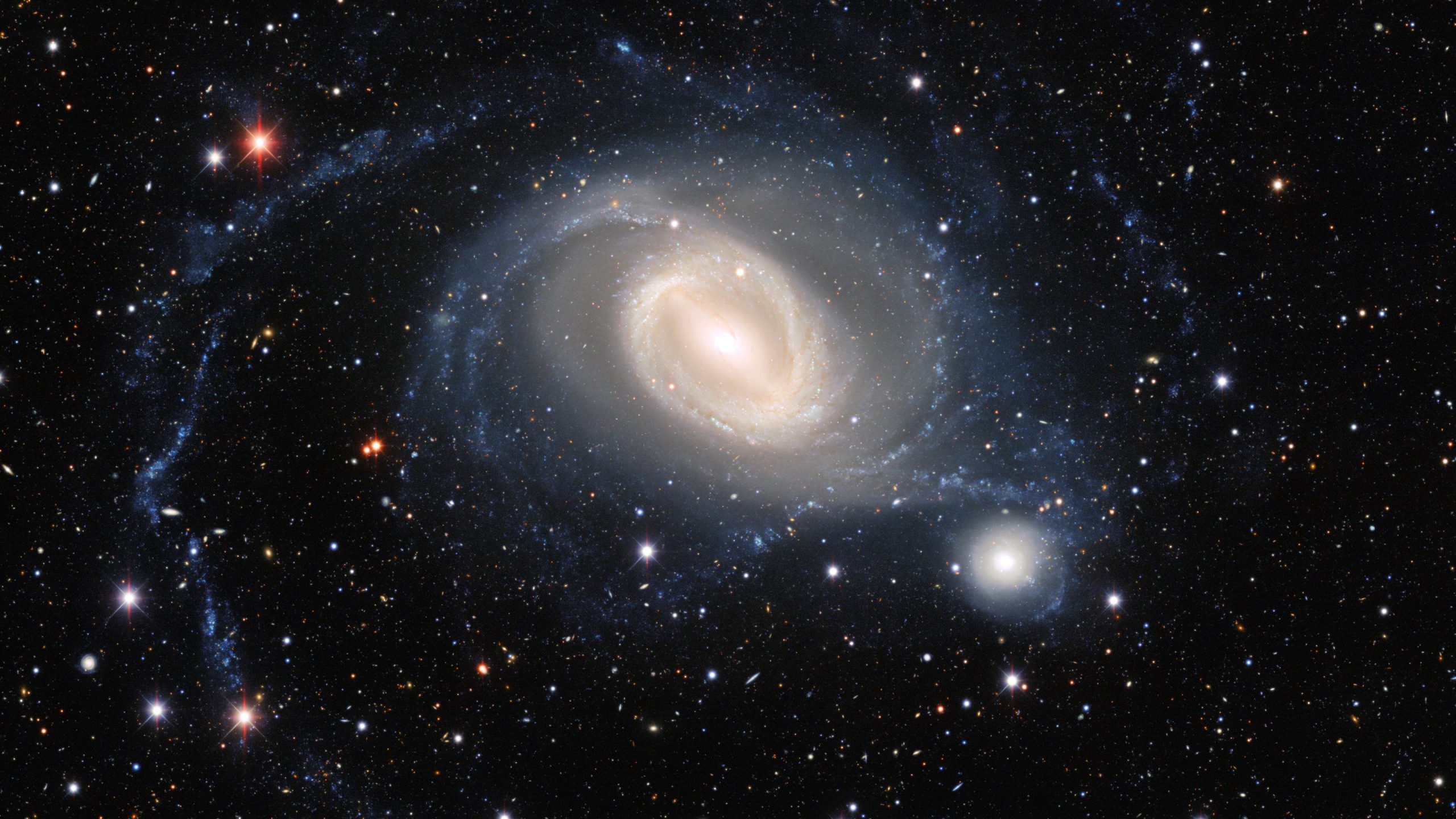
NGC 1512 和 NGC 1510 的互动星系对在这张来自暗能量相机的图像中占据了中心位置,暗能量相机是 NSF 的 NOIRLab 计划 Cerro Tololo 美洲天文台的 Víctor M. Blanco 4 米望远镜上的最新宽视场成像仪. NGC 1512 与它的较小星系邻居合并的过程已经有 4 亿年了,这种长期的相互作用引发了恒星形成的浪潮并扭曲了两个星系。 图片来源:暗能量调查/DOE/FNAL/DECam/CTIO/NOIRLab/NSF/AURA,图像处理:TA Rector(阿拉斯加大学安克雷奇/NSF 的 NOIRLab),J. Miller(双子座天文台/NSF 的 NOIRLab),M. De Martin (NSF 的 NOIRLab)
NSF 位于智利的 NOIRLab 的能源部资助的暗能量相机捕捉到了一对执行引力双筒望远镜的星系。
交互式星系对 NGC 1512 和 NGC 1510 在这张来自美国能源部暗能量相机的图像中占据了中心位置,这是在 Cerro Tololo 美洲的 Víctor M. Blanco 4 米望远镜上最新的 570 兆像素宽视场成像天文台,它是 NSF NOIRLab 的附属项目。 NGC 1512 与它较小的银河系邻居合并的过程已经有 4 亿年了,这种长期的相互作用引发了恒星形成的浪潮。
本次观测中的屏障螺旋星系 NGC 1512(左)和它的小星系 NGC 1510(文章顶部的图片)由 4 米长的维克多·M·布兰科望远镜拍摄。 除了揭示 NGC 1512 复杂的内部结构外,这张照片还显示了星系微弱的外部卷须延伸并似乎围绕着它的小伴星。 连接两个星系的星光流是它们之间引力相互作用的证据——一种持续了 4 亿年的奢华而优雅的连接。 NGC 1512 和 NGC 1510 之间的引力相互作用影响了两个星系中恒星的形成速度并扭曲了它们的形状。 最后,NGC 1512 和 NGC 1510 将合并成一个更大的星系——这是一个漫长的星系演化例子。

更广泛的 NGC 1512 图像。图片来源:Dark Energy Survey/DOE/FNAL/DECam/CTIO/NOIRLab/NSF/AURA,图像处理:TA Rector(阿拉斯加大学安克雷奇/NSF 的 NOIRLab),J. Miller(Gemini 天文台/NSF 的NOIRLab),M. de Martin(NSF 的 NOIRLab)
这些相互作用的星系位于南天半球的钟表星座方向,距离地球约 6000 万光年。 这次观测的广阔视野不仅显示了纠结的星系,还显示了它们的星空环境。 框架里面充满了明亮的前星[{” attribute=””>Milky Way and is set against a backdrop of even more distant galaxies.
The image was taken with one of the highest-performance wide-field imaging instruments in the world, the Dark Energy Camera (DECam). This instrument is perched atop the Víctor M. Blanco 4-meter Telescope and its vantage point allows it to collect starlight reflected by the telescope’s 4-meter-wide (13-foot-wide) mirror, a massive, aluminum-coated, and precisely shaped piece of glass roughly the weight of a semi truck. After passing through the optical innards of DECam — including a corrective lens nearly a meter (3.3 feet) across — starlight is captured by a grid of 62 charge-coupled devices (CCDs). These CCDs are similar to the sensors found in ordinary digital cameras but are far more sensitive, and allow the instrument to create detailed images of faint astronomical objects such as NGC 1512 and NGC 1510.

An even wider crop of the NGC 1512 image. Credit: Dark Energy Survey/DOE/FNAL/DECam/CTIO/NOIRLab/NSF/AURA, Image processing: T.A. Rector (University of Alaska Anchorage/NSF’s NOIRLab), J. Miller (Gemini Observatory/NSF’s NOIRLab), M. Zamani & D. de Martin (NSF’s NOIRLab)
Large astronomical instruments such as DECam are custom-built masterpieces of optical engineering, requiring enormous effort from astronomers, engineers, and technicians before the first images can be captured. Funded by the US Department of Energy (DOE) with contributions from international partners, DECam was built and tested at DOE’s Fermilab, where scientists and engineers built a “telescope simulator” — a replica of the upper segments of the Víctor M. Blanco 4-meter Telescope — that allowed them to thoroughly test DECam before shipping it to Cerro Tololo in Chile.
DECam 的成立是为了开展暗能量调查 (DES),这是一项为期六年(2013-2019 年)的观测活动,涉及来自七个国家的 25 个机构的 400 多名科学家。 这项国际合作旨在绘制数亿个星系的地图,发现数千颗超新星,并发现宇宙结构的微妙模式——所有这些都是为了提供有关加速宇宙膨胀的神秘暗能量的急需细节。 今天,DECam 仍然被世界各地的学者用于软件,以继续其尖端科学的遗产。

“创作者。屡获殊荣的问题解决者。音乐布道者。无法治愈的内向。”





More Stories
詹姆斯·韦伯太空望远镜检测到超大质量黑洞附近的冲击(图片)
研究表明,富含水果和蔬菜的饮食可以降低患心脏病和肾脏疾病的风险
中国的巨大陨石坑里有“天堂”森林,其中的植物适应了严酷的地下生活